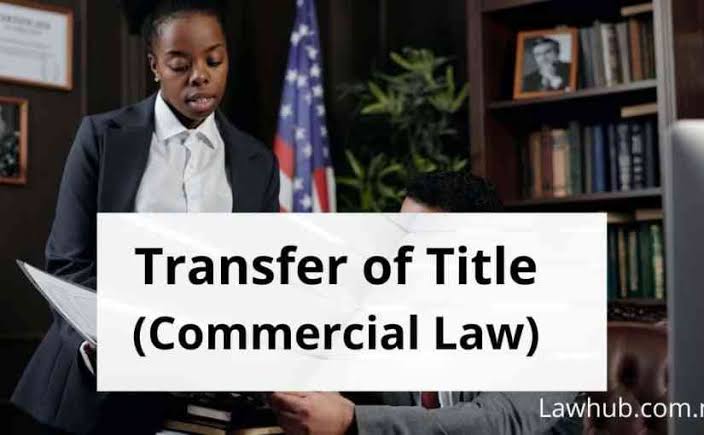N.B. This article is particular to Nigeria.
Transfer of Title
Want to learn about transfer of title in commercial law? Continue reading below.
The effect of a contract of sale as regards transfer of title may be broadly divide into three main groups:
- The seller would be transferring a valid title
- If the property in the goods is not transferred immediately, it would be transferred at some stage of the contract
- The person on whom the risk of loss is with is known at all times and the effect on both parties
THE BASIC RULE
The general rule is that a person cannot transfer a better title than he has himself. In simple language, you cannot transfer what you do not have. This principle has been summed up in the Latin maxim “nemo dat quod non habet”. However, the rule is that a buyer cannot acquire a better title than that which the seller has. This basic rule has been embodied in section 21(1).
Strict adherence to the basic rule would protect & preserve property so that no one can give a better title than himself has despite the rule, however, it must be emphasied that the sellers either fraudulently allowed innocent third parties to deal with such seller in respect of those goods for value.
Lord denning elucidated this in the case of bishopgates motor finance corp v. transport blakes ltd. This principle was also illustrated in the classical case of Hollins v. fowler. It must further be noted that s.21 of the sale of goods act, provides that a seller is under a duty to transfer a good title to the purchaser and failure to do so would lead to a breach. For a third party to succeed against the original owner, he must show the following:
i. He had taken the goods in good faith and for value
ii. He had no knowledge or notice that anyone else had a better title than the person form whom he was purchasing the goods.
EXCEPTION TO THE BASIC RULE
- AGENCY: the very wordings of s.21(1) provides for this exception i.e where a person sells goods under the authority of the owner, he can pass a good title. Such authority may be implied, express, or apparent.
– - ESTOPPEL: the wording of s.21(1) further adds to this exception when it stated “… unless the owner of the goods is by his conduct precluded from denying the seller’s authority to sell”. Thus, an owner can be estopped from denying the seller’s authority to sell where by his words he represents to the buyer that the person in possession of the property was either the true owner or had authority to sell. Thus, in Henderson & co v. Williams, the real owner was estopped from denying the seller’s right to sell since had been held out to be real owner. Estopped can be divided into various types: these are
i. Estopped by representation
ii. Estopped by negligence
– - MERCHANTILE AGENT: although the SGA makes no specific reference to merchant agents s.21(2)(a) cover it by implication by stating that nothing the act is to affect the provisions of the factors act 1889. S.21(1) of the factors act 1889 provides that “where a merchantile agent is the consent of the owner in possession of goods any sales or pledge made by him when acting in the ordinary course in business… shall be valid as if he were expressly authorized by the owner”.
– - MARKET OVERT: s.22 of the act provides that where goods are sold in the market overt according to the usage of the market, the buyer acquires a good title to the goods provided he buys them in good faith and without notice of any defect or want of title on the part of the seller. A market overt has been defined as an open, public & legally constituted market where people buy and sell openly as opposed to shop outside the market. This is evident in mbanugo v. UAC of nig.
– - SALE UNDER VOIDABLE TITLE: s.23 provides that “where the seller has a voidable title thereto, but is title has not been avoided at the time of the sale, the buyer acquires a good title to the goods provided that he buys them in good faith”. Note that this section only applies to voidable title & not void ones. Thus, in philps v. brookes ltd, it was held that the pawn broker had a good title to the ring since the contract between the jeweler was good.
Other exceptions to the basic rule include: seller in possession, buyer in possession & writ of execution.
Contributed by: Abdulganiyu Ismail (AKA) Mastermind
Prepared and Written by: Ucheakonam Chijioke Joshua (CJ)


Leave a Reply